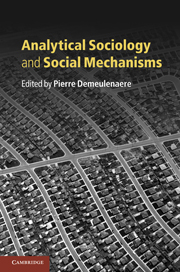Book contents
- Frontmatter
- Contents
- List of figures
- List of tables
- List of contributors
- Introduction
- Part I Action and mechanisms
- 1 Ordinary rationality: the core of analytical sociology
- 2 Indeterminacy of emotional mechanisms
- 3 A naturalistic ontology for mechanistic explanations in the social sciences
- 4 Conversation as mechanism: emergence in creative groups
- Part II Mechanisms and causality
- Part III Approaches to mechanisms
- Index
- References
1 - Ordinary rationality: the core of analytical sociology
Published online by Cambridge University Press: 05 June 2012
- Frontmatter
- Contents
- List of figures
- List of tables
- List of contributors
- Introduction
- Part I Action and mechanisms
- 1 Ordinary rationality: the core of analytical sociology
- 2 Indeterminacy of emotional mechanisms
- 3 A naturalistic ontology for mechanistic explanations in the social sciences
- 4 Conversation as mechanism: emergence in creative groups
- Part II Mechanisms and causality
- Part III Approaches to mechanisms
- Index
- References
Summary
Ordinary rationality: the core of analytical sociology
The notion of analytical sociology was originally created as a label for a sociology resting on well-defined and realistic principles potentially applicable to the various types of phenomena with which sociology deals. Analytical sociologists were dissatisfied both with the kind of sociology that treats social actors as irrational, as conditioned and moved by social and cultural forces; and with so-called Rational Choice Theory, which treats them as rational, but only in a very restricted sense of the term. I would like to offer instead a notion of Ordinary Rationality. The consequent Theory of Ordinary Rationality is capable of resolving this persistent dissatisfaction, and is I believe well-suited to become the core principle, or grammar, of analytical sociology.
Modern social scientists generally endorse an instrumental conception of rationality. Most would agree with Herbert Simon's statement that “Reason is fully instrumental. It cannot tell us where to go; at best it can tell us how to get there” (1983, 7–8). This leads to the dualistic view that people rationally choose the means they use to reach their goals, or be faithful to their values; while their goals, values and beliefs are imposed upon them by social, cultural, psychological or biological forces over which they have little control, and of which they might even be unaware. Many social scientists are very uncomfortable with this dualistic theory of social action.
- Type
- Chapter
- Information
- Analytical Sociology and Social Mechanisms , pp. 33 - 49Publisher: Cambridge University PressPrint publication year: 2011
References
- 9
- Cited by



